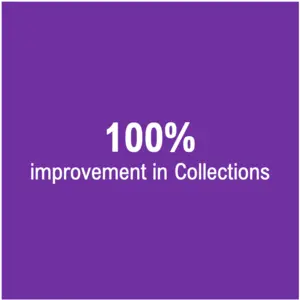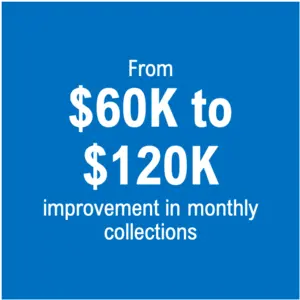Physical Therapy billing is unique and requires expertise to ensure holistic improvement. Medical Necessity and prior authorization issues can cripple a practice’s financial health. Structured revenue cycle methodologies and processes can help Physical Therapy clinics grow and thrive.

ViewPoint
With reducing reimbursements and increasing revenue cycle complexity, Physical Therapy revenue cycle managers need to focus on the basics. Most denials can be attributed to lack of insurance coverage and benefits verification, delays in filing claims, and lack of online EDI submission capabilities. Revisiting the basics can help revenue cycle managers achieve outstanding results. Start with the top 10 reasons why claims were denied and work on addressing the core issues. Diligent tracking of issues and working with physicians can yield as much as 2X improvement in collections and reduce denials by as much as 50%.
Results Summary



Customer Situation
A Staten Island-based New York-based physical therapy clinic focused on providing outstanding patient care with the most effective physical therapy techniques. The Clinic’s revenue cycle systems and processes were ineffective in keeping denials in check leading to reduced collections.
Issues were across the revenue cycle – lack of timely benefit checks, delays in charge approvals due to non-standard workflow, lack of comprehensive credentialing processes, ineffective appointment scheduling, and automated work processes.
Challenges
Medical Billing Wholesalers team of revenue cycle practitioners and managers looked at the issue and determined that the following challenges were leading to reduced reimbursements and increased denials.
- Eligibility and Benefits Verification was either not effective or not being performed at all
- There were inordinate delays in submitting claims via EDI as the approval for charges was taking time. Further, the clinic was not getting authorization for the rendered services within the period by insurance.
- With the physical therapists supporting multiple healthcare systems and hospitals across the region, lack of credentialing with all the insurances meant increased denials
- Quality of medical coding was an issue as well – leading to submission of ineligible codes or down-coded claims being submitted.
- The access to payer portals had not been configured which in turn led to excessive time being spent on routine tasks.
- The appointment scheduling process was not up-to-the-mark and caused immense patient dissatisfaction and lower utilization of the therapists.
Solution
When the clinic outsourced the processes to Medical Billing Wholesalers, we developed a comprehensive revenue cycle transformation plan. Our objective was to bring about holistic improvement by addressing all issues with the current state and help the practice grow. Our team of billers and coders executed the following solutions:
- Prior Authorization and Insurance Verification– Improving upfront collections.
- With appropriate benefit checks, we were able to update the patient insurance, and determine patient responsibility – co-pay and deductible – leading to improved patient collections.
- We were able to chart out and establish the insurance verification processes for most insurance companies that the practice dealt with. This included insurance phone numbers, mailing addresses, and patient records needed to get benefits checked, and obtain prior authorizations.
- Physical therapy often requires the determination of medical necessity and timely authorization can reduce denials and increase revenue.
- Appointment Scheduling – Improving the patient experience
- Improving the utilization of the therapists is key to the profitability of the practice. Partnering with the front end, we were able to automate patient reminders and help the practice increase patient footfall, schedule patients better, and improve the overall patient experience.
- Medical Coding – Eliminating ineligible codes.
- Our medical coders looked at the history of in-eligible codes and worked with the physicians to understand the procedures and apply the right codes.
- We also discussed specific claims with payers to confirm the use of the right CPT codes and incorporated these findings into our daily medical coding processes.
- Physician Credentialing – Denials that should be avoided.
- Let’s face it. Physician credentialing is not as complex as it is made out to be. It requires an understanding of the payers that the healthcare provider deals with and rigor in submitting the physician credentials to the payer as well as timely follow up to enroll the physician into the payer’s database. Credentialing relates are avoidable and the Medical Billing Wholesalers team ensures that you have as minimal issues by adhering to payer-specific credentialing processes.
- EDI/ERA/Portal Set up – Importantly functionality that all practices should use.
- Timely claims submission is important to avoid timely filing denials. EDI functionality can help the medical practice file claims on time.
- Further, we also established the approval processes for the charges to reduce the number of claims awaiting approval for being submitted to insurance carriers.
- We established online portal access with all the insurances to get timely updates on the status of clams and inquire via the portal to avoid effort in calling the payers.
Result
Achieving and exceeding revenue cycle KPIs is a function of the process rigor followed by the team and an unwavering focus on improving outcomes each day. Needless to say, it is as much an art as it is a science. It requires one to challenge established billing practices through an analytics-based approach to improve the outcomes.
With ongoing cleansing of the Therapy clinic’s revenue cycle processes, we were able to improve the collections, increase patient visits, improve patient experience, and reduce denials.
- We can see the improvement of collections and reduce the denials and increase patient visits.
- We have increased average monthly collections from $60K to $120K from the period May 2017 to Dec 2019 also decreased the average denials from 655 to 325 claims for the same period

